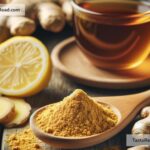Gingerol: A Natural Ally for Lung Health and Better Breathing
When you think of ginger, you probably picture a spicy root that adds flavor to food and warms you up on a chilly day. But did you know that ginger contains a powerful natural compound called gingerol that offers incredible health benefits, especially for your lungs and respiratory system? Gingerol is the secret ingredient that helps ginger shine as a health-promoting superfood. In this blog, we’ll take a closer look at how gingerol can improve lung function and support respiratory health—using simple language anyone can understand.
What is Gingerol?
Gingerol is a naturally occurring substance found in fresh ginger. It’s what gives ginger its spicy, slightly sweet flavor and its famous health benefits. This compound belongs to a group of chemicals called phenols, which are known for their antioxidant and anti-inflammatory properties.
Interestingly, gingerol shares some similarities with capsaicin, the compound that makes chili peppers spicy. However, gingerol is much gentler, and its effects on the body are known to be both healing and calming.
How Can Gingerol Help Your Lungs?
To understand how gingerol supports lung and respiratory health, it’s important to know why inflammation is often a key concern. Your lungs constantly interact with the outside world—every breath brings in oxygen but can also introduce irritants like pollution, smoke, allergens, and germs. Over time, these irritants can trigger inflammation in your airways, making it harder for your lungs to function properly. Chronic inflammation can even contribute to conditions like asthma or chronic obstructive pulmonary disease (COPD).
This is where gingerol steps in to help. Below are some specific ways gingerol can improve lung function and respiratory health:
1. Fights Inflammation in the Airways
One of gingerol’s most impressive abilities is reducing inflammation. Think of inflammation as swelling that makes your airways narrow and harder to breathe through. Gingerol works by calming the immune system and limiting the production of inflammatory chemicals in the body. This can relieve airway swelling and make breathing easier. For people with asthma or other chronic respiratory conditions, gingerol’s anti-inflammatory effects may provide much-needed relief.
2. Clears Mucus and Opens Airways
If you’ve ever had a cough with mucus, you know how frustrating it can be when your airways feel clogged. Gingerol helps thin and loosen mucus, making it easier for your lungs to expel unwanted substances. Additionally, gingerol has a soothing effect on the muscles in your airways, helping them relax and open up. This can improve airflow and reduce feelings of tightness in the chest.
3. Protects Cells from Oxidative Stress
Our lungs are constantly exposed to environmental toxins like cigarette smoke, air pollution, and harmful chemicals. Over time, these toxins create oxidative stress, which damages lung cells and accelerates respiratory issues. Gingerol’s antioxidant properties act as a shield against oxidative stress, helping protect lung tissues and maintain overall lung health. Antioxidants are like the body’s cleanup crew, and gingerol plays a starring role in removing harmful substances before they can cause damage.
4. Supports Better Immunity
Your respiratory system is the first line of defense against infections like the flu, colds, or even pneumonia. Gingerol strengthens your immune system and makes your body better equipped to fight off invaders. This means fewer respiratory infections and faster recovery when you do get sick.
How to Use Ginger to Boost Your Lung Health
Adding ginger to your diet is a simple and natural way to enjoy the benefits of gingerol. Here are some easy and tasty ways to use ginger for respiratory health:
1. Ginger Tea: Brew fresh slices of ginger in hot water and drink it as tea. Add honey and lemon for extra soothing effects.
2. Smoothies: Blend ginger into your favorite smoothies for a zesty kick and a boost of health-promoting goodness.
3. Cooking: Use fresh ginger in recipes, from stir-fries to soups and marinades.
4. Ginger Supplements: If fresh ginger isn’t available, ginger supplements or capsules can provide a concentrated dose of gingerol.
Remember, moderation is key. While ginger is generally safe for most people, consuming it in very large amounts might cause mild side effects such as heartburn or digestive upset.
Who Can Benefit from Gingerol?
Everyone can benefit from the respiratory health benefits of gingerol, but it may be particularly helpful for:
- People with asthma or COPD
- Smokers or ex-smokers
- Those prone to respiratory infections
- Individuals exposed to high levels of air pollution
If you have a chronic lung condition, it’s always wise to discuss dietary changes or supplements with your doctor first.
Final Thoughts
Gingerol from ginger is a remarkable natural compound that supports lung health and promotes better respiratory function. By fighting inflammation, reducing mucus, protecting lung cells, and boosting immunity, gingerol can help you breathe easier and enjoy a healthier life overall.
Adding ginger to your daily routine is an easy and delicious way to support your lungs, whether you’re sipping ginger tea or adding the fresh root to your meals. So, the next time you reach for ginger, remember—it’s not just a tasty spice; it’s also your ally for breathing better and living well.


